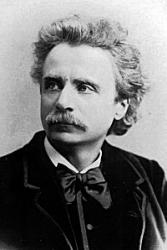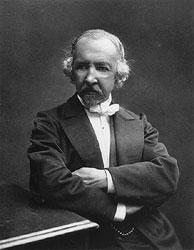Planning worship?
Check out our sister site, ZeteoSearch.org,
for 20+ additional resources related to your search.
- |
User Links
Search Results
Fatherland's Psalm
Author: Nordahl Rolfsen Appears in 8 hymnals First Line: O God of hosts with thy strong hand
Fatherland's Psalm
O God of Hosts, with Thy Strong Hand
Author: Zacharias Topelius, 1818-1898; Nordahl Rolfsen, 1848-1928 Hymnal: The Cyber Hymnal #4894 Meter: 8.8.8.8 Lyrics: 1. O God of Hosts, with Thy strong hand,
Protect the sons of our fair land;
Be Thou our Shield in war or peace,
And guide our steps till life shall cease.
2. Thou Lord, defend this land of ours,
Its smiling shores, its mountain towers;
Thy blessing on its future shed
Like morning dew when night is fled.
3. In truth and light we fain would grow,
Thy laws would love, Thy Word would know;
In Thee we will for aye abide;
O Lord of all, be Thou our guide! Languages: English; Norwegian Tune Title: GRIEG
O God of Hosts, with Thy Strong Hand
O God of Hosts, with thy strong hand
Author: Nordahl Rolfsen Hymnal: The Army and Navy Hymnal #OW265 (1921)
O God of Hosts, with thy strong hand
O God of Hosts, with thy strong hand
Author: Nordahl Rolfsen Hymnal: Hymnal for American Youth #P58 (1919) Languages: English Tune Title: HAGERUP
O God of Hosts, with thy strong hand
Edvard Grieg

1843 - 1907 Person Name: Edvard Hagerup Grieg, 1843-1907 Composer of "GRIEG" in The Cyber Hymnal Edvard Hagerup Grieg Born at Bergen, Norway, of Scottish descent, son of a merchant and vice-consul in Bergen, his mother was a music teacher. He became a pianist and composer, with his standard classical repertoire known worldwide. He developed Norwegian folk music into his own compositions, helping to develop a national musical identity. As a child his mother taught him piano from age six. He attended several schools. His uncle, a Norwegian violinist, recognized his nephew’s talents at age 15 and urged his parents to send him to the Leigzig Conservatory in Germany. He enrolled there and concentrated on piano. He enjoyed the many concerts and recitals given in Leipzig. He disliked the discipline of the conservatory course of study, but he loved the organ, mandatory for piano students. In 1860 he survived a life-threatening lung disease, pleurisy and tuberculosis. Throughout life, his health was impaired by a destroyed left lung and disformity of his thoracic spine. He suffered numerous respiratory infections, and ultimately developed combined heart and lung failure. He was admitted many times for various spas and sanatoria in both Norway and abroad. Several of his doctors became close friends. In 1861 he made his debut as a concert pianist at Karlshamm, Sweden. He finished Leipzig studies in 1862 and held a concert in his hometown, playing Beethoven’s ‘Pathetique’ sonata. In 1863 he went to Copenhagen, Denmark, remaining there three years. There he met Danish composers and a fellow Norwegian composer, Rikard Nordraak, who wrote the Norwegian National Anthem. When Nordraak died in 1866, Grieg composed a funeral march in his honor. In 1867 Grieg married his first cousin, Nina Hagerup. Their only child, Alexandra, was born the following year. She died from meningitis at age two. In 1868 he wrote his Piano Concerto in A-minor. It was performed by Edmund Nuepert in Copenhagen because Grieg was in Norway at the time, fulfilling other commitments. In 1868 Franz Liszt, not yet having met Grieg, wrote a testimonial of him, resulting in Grieg’s obtaining a travel grant. The two met in Rome in 1870. Each was impressed with the other’s musical accomplishments. Grieg had close ties with the Bergen Philharmonic Orchestra and became its leader 1880-1882. In 1888 Grieg met Tchaikovsky in Leipzig. He was struck by Tchaikovsky’s sadness. Tchaikovsky praised Grieg’s music. The Norwegian government awarded Grieg a pension. In 1903 he made gramophone recordings of his piano music in Paris, France. He also made live piano music rolls for the Hupfeld Phonola piano-player system and Weldt-Mignon reproducing system. He also worked with the Aeolian Company for its ‘Autograph Metro-style’ piano roll series, wherein he indicated the tempo mapping of many of his pieces. In 1906 he met pianist and composer, Percy Grainger, in London. Grainger was an admire of Grieg’s music, and they developed a strong empathy for each other. Grieg wrote of Grainger: “I have written Norwegian dances that no one in my country can play, and here comes this Australian who plays them as they ought to be played. He is a genius that we Scandinavians cannot do other than love.” Grieg and his wife considered themselves Unitarians, and attended that church denomination. When Grieg died after a long illness, at age 64, his funeral drew more than 30,000 people in his hometown, who came out to honor him. His own funeral march, in honor of Nordraak, was played, along with a 2nd march, by his friend, Johan Halvorsen, who married Grieg’s niece. Grieg was cremated, with ashes entombed in a mountain crypt. Later, his wife’s were placed with his.
John Perry
Edvard Grieg
Zacharias Topelius

1818 - 1898 Person Name: Zacharias Topelius, 1818-1898 Author of "O God of Hosts, with Thy Strong Hand" in The Cyber Hymnal Finnish writer and later rector of the Helsinki University
Zacharias Topelius
Nordahl Rolfsen
Person Name: Nordahl Rolfsen, 1848-1928 Translator (from Swedish to Norwegian) of "O God of Hosts, with Thy Strong Hand" in The Cyber Hymnal
Nordahl Rolfsen


 My Starred Hymns
My Starred Hymns

